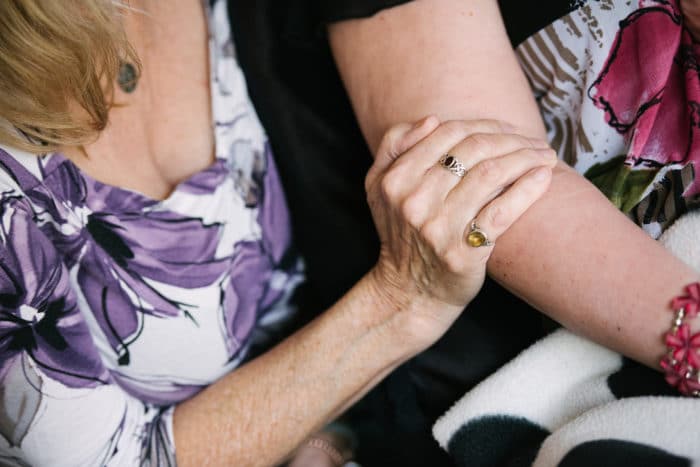Last month, we began the first of our six-blog series on the different types of dementia and how you and your family can continue to live a comfortable and independent life following a dementia diagnosis. With 30 years’ industry experience and recognition as one of the UK’s leading Dementia Home Care Specialists, we’re here to help you gain a better understanding of your or your loved ones’ condition and guide you through your journey.
Frontotemporal dementia (FTD) – sometimes referred to as Pick’s disease or frontal lobe dementia – is the second most commonly diagnosed type of dementia, but it is less common in the over-65 age group with most people being diagnosed between the ages of 45 and 64. Out of the 850,000 people in the UK living with dementia, there are at least 16,000 people living with FTD. With this blog, we explore the common causes and symptoms of FTD and what treatments are available to support you.

What is frontotemporal dementia?
FTD happens when the front and sides – the frontal and temporal lobes – of the brain are damaged by disease and the cells in either or both of these parts of the brain die, leading to symptoms that affect your behaviour, problem-solving, planning, speech and control of emotions.
The cause for why the brain develops this condition is often unknown, but there can be a genetic link. If you have a family history of FTD, you can speak to your doctor about being referred for a genetic test to see if you are at risk.
What are the symptoms?
There are three different types of FTD: behavioural variant and two types of language variants. Unlike other forms of dementia, such as Alzheimer’s, the memory generally tends to remain unaffected in the early stages. However, as it progresses, the symptoms for FTD are often similar to the later stages of Alzheimer’s disease. They may become less interested in people and become more restless and agitated.
Behavioural variant FTD is one of the most common types of this form of dementia. During the early stages, changes are often seen in the person’s personality and behaviour, which can often allude to a psychological condition before dementia.
The most common symptoms for someone living with behavioural variant FTD can include:
- Inappropriate behaviour – they could act impulsively or make inappropriate comments
- Lose motivation – they could lose interest in people and activities they used to enjoy
- Lack of empathy – they may become less responsive to the needs of others, show less social interest or become distant
- Repetitive behaviour – this could include the repeated use of phrases or gestures, obsessions with timekeeping or an intense new interest, such as music or spirituality
- Crave unhealthy substances – this can include sweet and fatty foods as well as forgetting table etiquette
These symptoms often develop over a number of years, but the later stages tend to develop into more physical problems, such as:
- Slow and stiff movements
- Incontinence – loss of bladder and bowel control
- Muscle weakness
- Difficulty swallowing
The two language variants of FTD are also known as progressive non-fluent aphasia (‘aphasia’ meaning loss of language) and semantic dementia. This is where the earlier symptoms show difficulties with language that progressively get worse over time. These difficulties often present themselves slowly, usually developing over the course of two or more years.
With progressive non-fluent aphasia, common early symptoms may include:
- Slurred speech – they may have slow, hesitant speech that seems difficult to produce
- Grammatical errors – they may have ‘telegraphic speech’ which leaves out small link words such as ‘to’, ‘from’, ‘and’ or ‘the’
- Reduced understanding – they may struggle to understand complex sentences, but not single words
With semantic dementia, there is no impairment to speech. However, people can begin to lose their vocabulary and understanding of objects. Some common early symptoms of semantic dementia are:
- No longer understanding the meaning of familiar words – for example, they may ask, “what is coffee?”
- Using descriptions for objects because they cannot find the right word – for example, they may ask for ‘the thing that turns the television on’ or use the word ‘animal’ instead of ‘dog’
- Finding difficulty in recognising familiar people or common objects

What else can be affected?
Around 10 – 20 per cent of people living with FTD also develop a motor disorder either before or after the start of dementia. These motor disorders cause difficulties with movement, and although they are generally uncommon, they are more likely in people with this form of dementia. They are:
The symptoms of these disorders are often similar, and can include muscle-twitching, stiffness, slow movements and loss of balance or co-ordination. The later stages of these conditions can also cause difficulties with swallowing.
Each of these motor disorders are all progressive diseases of the nervous system, which means that, sadly, they will get worse over time. However, there is an abundance of help available to those living with FTD and the associated motor disorders, whether it is speech & language therapy, physiotherapy or live-in home care packages to give you some extra support at home.
Living with frontotemporal dementia
Sadly, there is currently no cure for frontotemporal dementia, and although medication can’t necessarily stop the progression of frontotemporal dementia, it can help to reduce the symptoms for some people.
Antidepressants can sometimes help the control of compulsive behaviours, and antipsychotics – although rarely used – can be prescribed to control severely challenging behaviour that is putting the person with dementia, or others around them, at risk of harm.
As well as medication, there are a number of alternative therapies and practical measures that can be used to help someone to live well with dementia. These include:
- Occupational therapy – this can identify problem areas in everyday life, such as having a shower and making meals
- Speech & language therapy – this can help to improve any problems with communication or swallowing
- Physiotherapy – to help with any difficulties with movement and mobility
- Relaxation techniques – these can help you or your loved one to be distracted from their symptoms and can include massages, music or dance therapy
- Social interaction – there are many activities, such as dementia cafés, that offer drop-in sessions to get support and advice as well enabling those living with dementia to interact with others
- Strategies for challenging behaviour – these can include distraction techniques, daily routines and ‘brain games’ such as jigsaw or crossword puzzles
Those living with the later stages of FTD often require constant monitoring and support. Here at Helping Hands, our aim is to ensure that we provide the right level of care that is needed to those living with FTD, so that they are enabled to live safely and comfortably in the familiarities of their own home for as long as possible.
Whether that is with regular drop-in visits throughout the day to assist with day-to-day tasks, or a live-in carer to provide round-the-clock support for you or your loved one, we offer tailor-made care packages that are built entirely around you.
To find out more about dementia and its variants, you can visit our dedicated dementia page where you can find more tips on living with the condition, download a Life Story Book template or arrange visiting or live-in care for you or your loved one.
To read about the different types of dementia, please click here.
